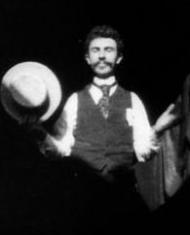Berlin Olympics
In 1936, Owens arrived in Berlin to compete for the United States in the Summer Olympics. Adolf Hitler was using the games to show the world a resurgent Nazi Germany. He and other government officials had high hopes that German athletes would dominate the games with victories (the German athletes achieved a "top of the table" medal haul). Meanwhile, Nazi propaganda promoted concepts of "Aryan racial superiority" and depicted ethnic Africans as inferior. Owens countered this by winning four gold medals.
On August 3, he won the 100m sprint with a time of 10.3s, defeating Ralph Metcalfe. On August 4, he won the long jump with a leap of 26 ft 5 in (later crediting his achievement to the technical advice he received from Luz Long, the German competitor who he ultimately defeated). On August 5, he won the 200m sprint with a time of 20.7s, defeating Mack Robinson (the older brother of Jackie Robinson). On August 9, Owens won his fourth gold medal in the 4x100 sprint relay when coach Dean Cromwell replaced Jewish-American sprinters Marty Glickman and Sam Stoller with Owens and Ralph Metcalf, who teamed with Frank Wykoff and Foy Draper to set a world record of 39.8s in the event. This performance was not equaled until Carl Lewis won gold medals in the same events at the Soviet boycotted 1984 Summer Olympics in Los Angeles. In 1935 (the year before the Berlin Olympics), Jesse Owens set the world record in the long jump with a leap of 26 ft 8 in, and this record would stand for 25 years (a very rare length of time for a track and field record), until it was finally broken by Ralph Boston in 1960. In an ironic coincidence, Owens was a spectator at the 1960 Summer Olympics in Rome when Boston took the gold medal in the long jump.
Just before the competitions, Owens was visited in the Olympic village by Adi Dassler, the founder of the Adidas athletic shoe company. He persuaded Owens to use Gebrüder Dassler Schuhfabrik shoes, the first sponsorship for a male African-American athlete.
The long-jump victory is documented, along with many other 1936 events, in the 1938 film Olympia by Leni Riefenstahl.
On the first day, Hitler shook hands only with the German victors and then left the stadium. Olympic committee officials insisted Hitler greet every medalist or none at all. Hitler opted for the latter and skipped all further medal presentations.
Albert Speer writes that Hitler reflected upon Owens's victories with a shrug as African physiques were primitive and stronger than whites.
Owens was allowed to travel with and stay in the same hotels in Germany as whites, while at the time African Americans in many parts of the United States had to stay in segregated hotels while traveling. During a New York City ticker-tape parade on Fifth Avenue in his honor, someone threw a paper bag into Owens' car as it worked its way up Broadway. Thinking it was probably just some cookies, Owens paid it little mind until the parade concluded. When he opened it up, he found the bag contained $10,000 in cash. After the parade, Owens had to ride the freight elevator at the Waldorf-Astoria to reach the reception honoring him. FDR never invited Jesse Owens to the White House following his triumphs at the Olympics games. Since 1936 was a presidential-election year, Roosevelt was afraid that he would lose southern votes if he played Kowtow to a black man. Jesse Owens also publicly endorsed Alf Landon during the upcoming election.
Hitler sent Owens a commemorative inscribed cabinet photograph of himself. Honors were not bestowed upon Jesse Owens by either President Franklin D. Roosevelt (FDR) or his successor Harry S. Truman during their terms. In 1955, President Dwight D. Eisenhower (himself an athlete of note) honored Owens by naming him an "Ambassador of Sports."

